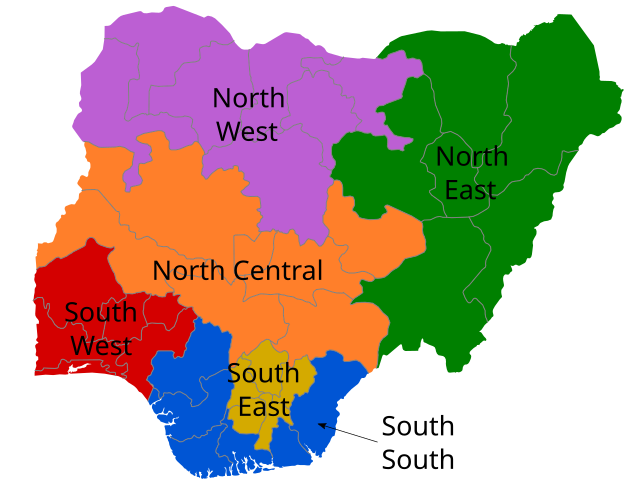Loading AI tools
Major geopolitical division in modern Nigeria From Wikipedia, the free encyclopedia
The Federal Republic of Nigeria is divided into six geopolitical zones, commonly just called zones. They are a type of administrative division grouping the country's states, created during the regime of president General Sani Abacha. Nigerian economic, political, and educational resources are often shared across the zones.[1][2][3][4][5][6]: 98

The six zones were not entirely carved out based on geographic location, but rather states with similar ethnic groups, and/or common political history were classified in the same zones.[citation needed] Nigeria is made up of approximately 400 ethnic groups and 525 languages. There was a need for the government to merge similar groups for the effective allocation of resources.
Many groups and individuals in Nigeria including the Afenifere Renewal Movement through its National Publicity Secretary, Mr. Yinka Odumakin, Ohaneze Ndigbo, its late Secretary General, Chief Ralph Uwechue and Ijaw National Congress through its National President, Mr. Joshua Benameisigha have canvassed that the current six zonal divisions be recognized in Nigeria's constitution and be strengthened to function as federating units in the new structure for Nigeria.[7]
According to Chief Nengi James, a Niger Delta activist, "for all sections of the country to become one entity, the geopolitical zones must be recognized in the constitution." These groups are pushing for devolution of powers so that the geopolitical zones become autonomous and manage the resources within their territories in a federal Nigeria.[7]
Seamless Wikipedia browsing. On steroids.
Every time you click a link to Wikipedia, Wiktionary or Wikiquote in your browser's search results, it will show the modern Wikiwand interface.
Wikiwand extension is a five stars, simple, with minimum permission required to keep your browsing private, safe and transparent.